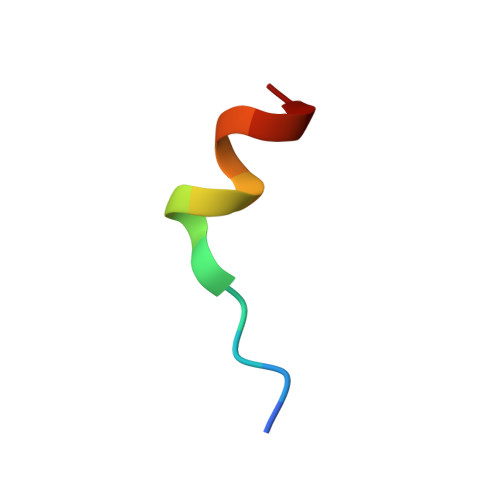A selective peptide inhibitor of Frizzled 7 receptors disrupts intestinal stem cells.
Nile, A.H., de Sousa E Melo, F., Mukund, S., Piskol, R., Hansen, S., Zhou, L., Zhang, Y., Fu, Y., Gogol, E.B., Komuves, L.G., Modrusan, Z., Angers, S., Franke, Y., Koth, C., Fairbrother, W.J., Wang, W., de Sauvage, F.J., Hannoush, R.N.(2018) Nat Chem Biol 14: 582-590
- PubMed: 29632413
- DOI: https://doi.org/10.1038/s41589-018-0035-2
- Primary Citation of Related Structures:
5W96, 5WBS - PubMed Abstract:
Regeneration of the adult intestinal epithelium is mediated by a pool of cycling stem cells, which are located at the base of the crypt, that express leucine-rich-repeat-containing G-protein-coupled receptor 5 (LGR5). The Frizzled (FZD) 7 receptor (FZD7) is enriched in LGR5 + intestinal stem cells and plays a critical role in their self-renewal. Yet, drug discovery approaches and structural bases for targeting specific FZD isoforms remain poorly defined. FZD proteins interact with Wnt signaling proteins via, in part, a lipid-binding groove on the extracellular cysteine-rich domain (CRD) of the FZD receptor. Here we report the identification of a potent peptide that selectively binds to the FZD7 CRD at a previously uncharacterized site and alters the conformation of the CRD and the architecture of its lipid-binding groove. Treatment with the FZD7-binding peptide impaired Wnt signaling in cultured cells and stem cell function in intestinal organoids. Together, our data illustrate that targeting the lipid-binding groove holds promise as an approach for achieving isoform-selective FZD receptor inhibition.
- Department of Early Discovery Biochemistry, Genentech, South San Francisco, CA, USA.
Organizational Affiliation:
















